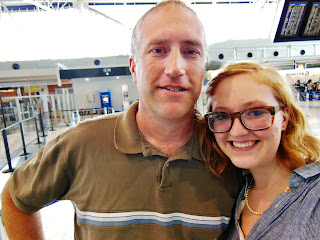This week, I've been running around with the international students before classes start. At KAIST, there are a large number of international students from France, Germany, and the Scandinavian countries. Ergo, many of my conversations over the past couple of days have consisted of comparing America to various European countries--and honestly, it's been really enlightening as to many unnoticed American habits. For instance, a common trend in many cultural discrepancies is the American resistance to change--the most illustrative and noticeable example being the metric system usage (or lack thereof). A fundamental value of America is the idea of "freedom", and often, we perceive change as infringing on our freedoms--and thus, we are left with many outdated and misaligned conventions.
Many of the Europeans have expressed confusion or dissatisfaction with the fact that America is a single country. And we do walk a precarious balance between states rights and federal rights--a balance that would be very difficult to implement anywhere else in the world. And so is the case with many cultural idiosyncrasies--what policies are effective for America will be different from what policies will be effective for Norway, or China, or Germany, or France.
As a student of nuclear engineering, I am a proponent of nuclear energy and its benefits. I understand that each decision has a cost, but I am of the opinion that the opportunity cost is in favor of nuclear energy. However, defending my field of study to students who were raised in a society that is not supportive of nuclear energy has been trying. At times, I become frustrated, wondering why people can't understand something that seems so obvious to me. Empathy is a topic I have yet to completely master.
I try to stay informed on global news, as well as the news of my own country, but conversations with students from other countries revealed just how differently news is relayed to Americans than to other countries. Only two days ago, I heard for the first time about the 2011 Norway attacks--a lone wolf terrorist ploy agains the Norwegian government. It was expressed to me that my not knowing about the massacre in Norway is akin to someone from France or Germany not hearing about 9/11. Because we are such a large country, composed of many states with varying cultures, it is an unfortunate consequence that the news that is broadcasted is largely unconcerned with foreign issues.
For many people, drinking alcohol is an integral part of forming bonds and connecting socially. However, because of a number of reasons, namely my upbringing, this is not the case for me. I have found this to be difficult--as I can occaisionally feel alienated when I don't understand references to drinking culture, or opt not to drink beer. This is especially apparent among international students primarily from Germany, France, Italy, and Scandinavian countries, particularly in a country such as South Korea in which alcohol is so relatively cheap, and drinking is so ingrained in the local culture.
On the other side of alienation, one of the best parts about a massive integration of cultures is the consequential sense of uniqueness. As one of the only Americans, surrounded by Europeans, and East Asians, and Middle Easterners, I feel much less ordinary. When interacting with people who have fewer similarities, one gains a more defined sense of identity--and that's a great feeling.
 |
| It's always funny to find references to our respective countries in South Korea. |
 |
| *jumping photo intended to symbolize cultural immersion or something* |




